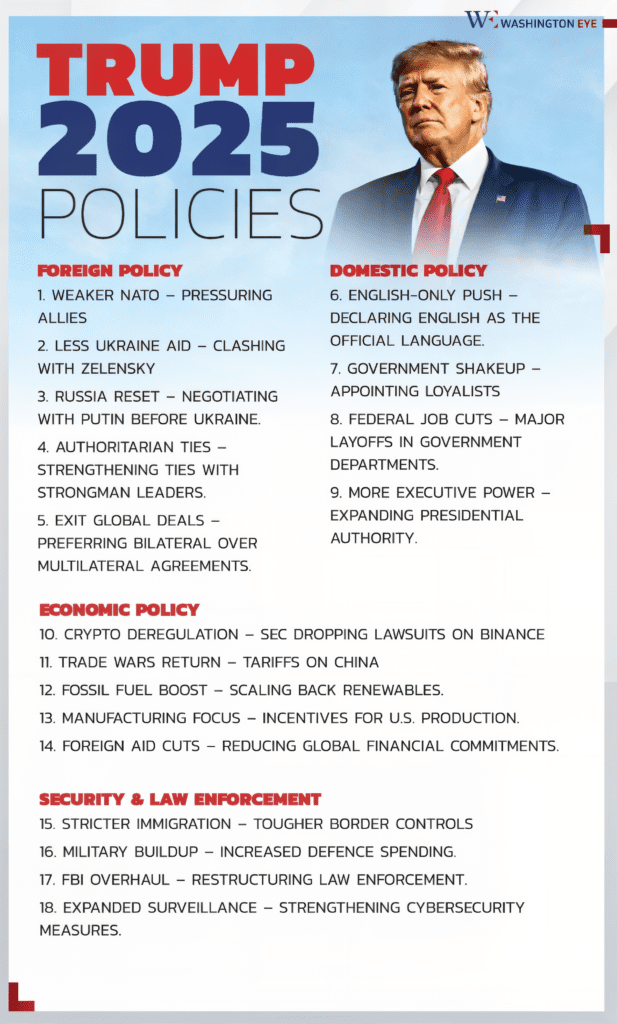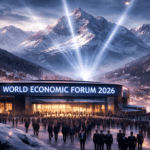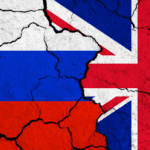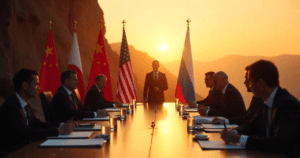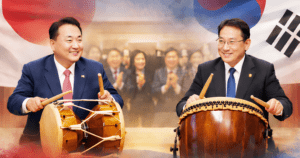As Donald Trump assumes office in 2025 for his second, non-consecutive term as the 47th President of the United States, his administration is rapidly enacting policies that challenge the established global order.
With a new approach to NATO, shifting alliances, and a bold domestic agenda, Trump’s leadership is redefining America’s role on the world stage. His administration’s realignment with authoritarian-leaning states, economic deregulation, and an aggressive stance on geopolitical rivals signal a significant transformation in international relations.
The Trump Doctrine: Isolationism and the Undermining of NATO
Trump’s skepticism toward NATO has resurfaced, with renewed pressure on member states to increase their defence spending. His administration’s reluctance to reaffirm Article 5—the collective defense clause—has caused anxiety among European allies. Reports indicate that Trump’s team is exploring policies that would shift U.S. defence priorities away from NATO’s traditional commitments, creating opportunities for Russia to expand its influence in Eastern Europe.
This shift aligns with President Vladimir Putin’s long-standing goal of a weakened Western alliance. Trump’s recent stance on NATO is emboldening Russia, as evidenced by his administration’s reluctance to commit to further military aid to Ukraine.
His transactional approach to international alliances, based on economic benefits rather than shared security interests, threatens to fracture NATO’s unity.
Trump’s Approach to Ukraine: A Departure from U.S. Support
One of the clearest indications of Trump’s realignment is his contentious relationship with Ukrainian President Volodymyr Zelensky. A recent White House meeting between the two leaders ended in a tense exchange, with Trump demanding an apology from Zelensky for past criticism—an apology that was not given. The meeting, intended to discuss a U.S.-Ukraine partnership over rare earth minerals, highlighted Trump’s shifting priorities.
The apparent softening of U.S. policy toward Russia is likely to leave Ukraine vulnerable, reducing U.S. military and financial support. Critics argue that Trump’s willingness to negotiate directly with Russia, potentially over territorial concessions, could embolden Putin and destabilize Eastern Europe further.
This approach reflects a broader pattern of deference to authoritarian leaders and a strategic recalibration that prioritizes economic negotiations over traditional alliances.
A ‘New World Order’ Shaped by Strategic Realignment
Trump’s foreign policy choices signal an emerging ‘New World Order’ in which authoritarian states gain greater influence while democratic alliances weaken. His admiration for strongman leaders such as Vladimir Putin and Kim Jong-un suggests a shift away from the post-World War II international framework that emphasized liberal democratic cooperation.
This geopolitical transformation could reshape the balance of power in ways that significantly alter global diplomacy. With U.S. leadership in international institutions diminishing, authoritarian regimes may gain more ground in influencing global policies, particularly in regions experiencing power vacuums.
As Trump recalibrates alliances based on economic interests rather than strategic security imperatives, the consequences could include reduced accountability for human rights violations and a weakening of international norms.
Domestic Policy: The Push for English as the Official Language
Trump’s nationalist ideology extends beyond foreign policy and into domestic governance. One of his key initiatives is making English the official language of the United States. While supporters argue that this policy promotes national unity, it also serves as a cultural wedge, potentially marginalizing immigrant communities and deepening social divisions.
Critics contend that such measures align with a broader right-wing nationalist movement that seeks to reinforce cultural dominance at the expense of diversity. The policy could have significant implications for education, government services, and social integration, particularly for non-English-speaking populations in the U.S.
Economic Policies: Deregulation and the Crypto Shift
Economically, Trump’s administration is taking a deregulatory approach, particularly concerning the cryptocurrency industry. The Securities and Exchange Commission (SEC) has significantly reduced its scrutiny of major crypto firms, dropping lawsuits against companies such as Binance and Coinbase. This shift aims to foster innovation but raises concerns about reduced regulatory oversight and the potential for market instability.
Additionally, Trump’s economic policies appear to favour protectionist strategies, which could lead to renewed trade conflicts. His first term saw aggressive tariff policies that disrupted global supply chains, and similar measures in his second term could further strain economic relations with key partners. With deregulation taking centre stage, the long-term economic impact remains uncertain.
The Changing Political Climate in Washington
Domestically, Trump’s administration is restructuring federal agencies with loyalists, raising concerns about the politicization of law enforcement and governance. The appointment of Dan Bongino as Deputy Director of the FBI exemplifies this trend, with critics warning that it could undermine the agency’s impartiality.
Meanwhile, the Democratic Party is facing internal strife, struggling to regroup after a disappointing 2024 election. Calls for leadership changes within the party underscore the broader political shift in Washington, as Trump’s influence over American politics solidifies once again.
A World in Transition
Trump’s second term marks a decisive break from traditional U.S. foreign policy and domestic governance norms. His approach to NATO, Ukraine, and global diplomacy suggests a world moving toward a fragmented, multipolar system where authoritarian influence grows and democratic alliances are tested.
His domestic policies reflect a vision of America that is increasingly nationalist, isolationist, and resistant to multiculturalism.
As these changes unfold, the global order faces a period of profound uncertainty. Allies question America’s long-term commitments, while adversaries see new opportunities to expand their influence.
Whether the world is prepared for such a dramatic shift remains an open question—but the stakes could not be higher.
